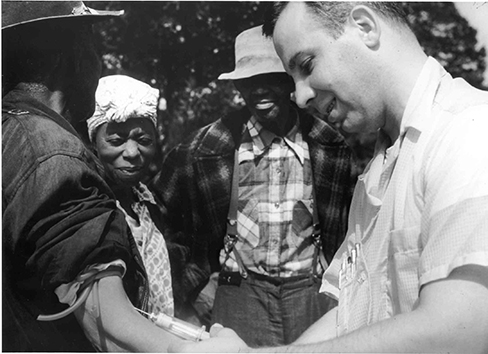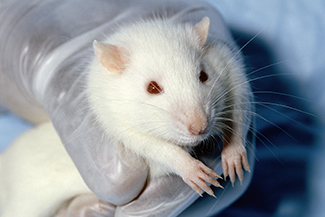Chapter 2. Psychological Research
2.4. Ethics
INSTITUTIONAL REVIEW BOARD (IRB)
Today, scientists agree that good research should be ethical in nature and guided by a basic respect for human dignity and safety, and the humane treatment of animals. However historically, there have been multiple studies that were highly unethical, both in medicine and psychology. In later chapters, you will read about the Milgram Study and the Stanford Prison study, two so-called “classical” studies in social psychology that caused considerable distress to the research participants. Modern-day protections for human participants grew from the actions of Peter Buxton, a journalist who exposed an exceptionally long-lasting, highly unethical medical study, called the Tuskegee study in the national press (see below for more details). As a consequence, the National Research Act was passed in 1974, which imposed strict ethical guidelines for research on humans. Modern-day researchers must demonstrate that the research they propose is ethically sound before it can begin. At every research institution, each study that involves human participants is reviewed by a committee of people. This committee is called the Institutional Review Board (IRB). The IRB typically consists of members of the institution’s administration and scientists, in addition to community members (Figure 2.11). The IRB reviews study proposals to ensure that they do not cause harm or undue distress to participants. Research studies must have IRB approval before they can begin.

The IRB has four main requirements for a research study to be considered ethical:
- Informed consent. A participant must provide informed consent before a study begins. This means that participants are informed about the purpose of the research, and what will happen to them during the study. They then are free to choose whether they consent to participate. They will often sign a consent form to indicate their agreement and to confirm that they have been informed about the study.
- Privacy. Researchers should not make observations of people in private places, such as restrooms or their homes, without their knowledge and consent. Researchers should not seek confidential information from others, such as school authorities, without consent of the participant or his or her guardian. Information that researchers learn about individual participants must not be made public without the consent of the individual.
- Risks and Benefits: People who participate in psychological studies should be exposed to risk only if they fully understand the risks and only if the potential benefits clearly outweigh those risks.
- Deception. Some researchers need to deceive participants in order to hide the true nature of the study. Deception is typically only permitted (a) when the benefits of the study outweigh the risks, (b) participants are not reasonably expected to be harmed, (c) the research question cannot be answered without the use of deception, and (d) participants are informed about the deception as soon as possible, usually through debriefing.
Ethics and the Tuskegee Syphilis Study
Unfortunately, the strict ethical guidelines that exist for research today were not always applied in the past. The 40-year-long Tuskegee Study is a particularly egregious example. In 1932, extremely poor Black men from Tuskegee, a rural area in Alabama, were recruited to participate in a study looking at how untreated syphilis affected Black men. The study was conducted by the U.S. Public Health Service (Figure 2.12). 600 men agreed to participate in the study, which they were told was to designed to treat “bad blood”. Bad blood was a colloquial name for any number of mostly minor ailments. More than half of the men tested positive for syphilis. However, none of the participants were informed whether that they had the disease, and were never informed about the true nature of the study. Moreover, the incentives they were offered (free medical care, meals, and burial insurance), can be considered coercive; the participants were on the poverty line and so it was probably hard for them to turn these benefits down.

Although there was no effective treatment for syphilis when the study began, by 1947 penicillin was being widely prescribed to cure the disease. Despite this, none of the participants were ever given penicillin. The study continued for 40 years and many of the participants unknowingly spread syphilis to their partners (and subsequently their children). Most eventually died as a consequence of having the untreated disease. This study was discontinued in 1972 when the study was discovered by the national press. In 1974, the National Research Act was passed and provided strict guidelines for research involving human participants. In 1973, survivors of the study sued the US government, resulting in a $10 million, out-of-court settlement in 1974. The settlement was paid to the families of the study participants, and any surviving participants. It was not until 1997 that President Bill Clinton issued a formal Presidential Apology for the study (Center for Disease Control, 2022).
Research Involving Animal Subjects
Some psychologists conduct research involving animals (Figure 2.13). Because many basic processes in many animals are sufficiently similar to those in humans, these animals are acceptable substitutes for research that would be considered unethical in human participants. However, the humane and ethical treatment of animal research subjects is a critical aspect of this type of research. Researchers must design their studies to minimize any pain or distress experienced by animal subjects.

Whereas IRBs review research proposals that involve human participants, animal experimental proposals are reviewed by an Institutional Animal Care and Use Committee (IACUC). An IACUC consists of institutional administrators, scientists, veterinarians, and community members. This committee is charged with ensuring the humane treatment of animal research subjects. It also conducts regular inspections of all animal facilities to ensure that the research protocols are being followed. No animal research project can proceed without the committee’s approval.
